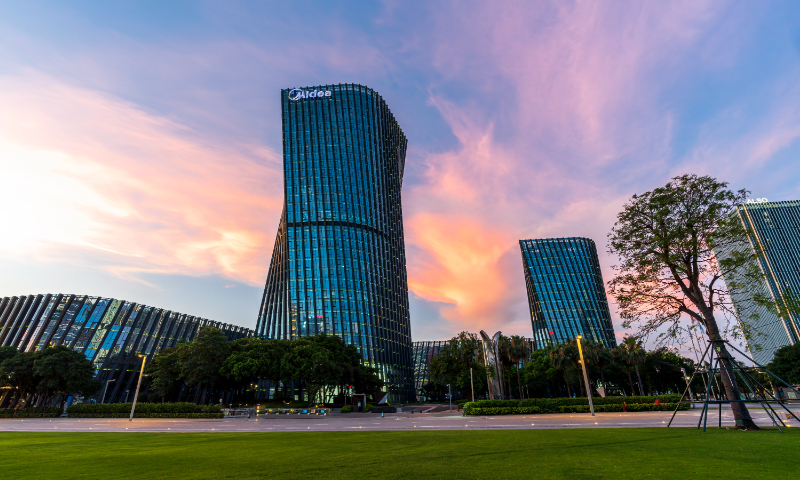The headquarters of Midea Group is seen in Shunde, South China’s Guangdong Province, on July 6, 2024. Photo: VCG
Multiple Chinese A-share listed companies have publicly addressed the potential impact of the latest US tariff hikes, emphasizing limited exposure to the US market and proactive global supply chain adjustments to cushion disruptions.
The US administration has slapped broad tariffs on nearly all imported goods with a baseline 10 percent duty on imports from all countries, prompting swift criticisms from US trading partners.
In response to the US' additional 34 percent tariff on Chinese products, the Customs Tariff Commission of the State Council announced on Friday that China will impose additional 34 percent tariffs on all products imported from the US starting from April 10. Multiple Chinese industry associations on Saturday expressed strong opposition against the US' so-called reciprocal tariff measures against Chinese imports.
Midea Group, a Chinese home appliance giant, told Global Times on Sunday that it has ramped up overseas production since 2023, noting that it has established smaller and more geographically dispersed factories overseas, allowing for greater flexibility in shifting production capacity among facilities.
"With our current footprint, coupled with existing operations in relatively low-tariff countries like Egypt and Brazil, we maintain a competitive cost advantage," the company said in a statement.
Suzhou Recodeal Interconnect System Co, a Chinese manufacturer of high-tech connection systems, said on Sunday that the latest US tariffs will further drive the company's localized production and sales at its overseas factories, enabling closer customer support and facilitating broader international business expansion, the Securities Times reported on Sunday.
Shenzhen-based medical technology and solutions supplier Mindray has addressed the impact of tariff measures on its sales and profitability. "We proactively stocked inventory in the US before the new tariffs took effect, ensuring no disruption to this year's sales," the company stated on the investor relationship interaction platform of the Shenzhen Stock Exchange.
The company further highlighted its global manufacturing network as a buffer against shifts in trade policy. "With dozens of production bases worldwide… we're well-positioned to serve global market demand," Mindray said, adding that developing countries, which account for two-thirds of its overseas revenue, remain the company's primary growth driver.
Boway Alloy Hightech Wire Co, a global high-end precision wire maker based in Ningbo, East China's Zhejiang Province, stated in a recent investor communication that its newly constructed 3-gigawatt solar cell expansion project in Vietnam will primarily serve European and Indian markets.
For its advanced materials business, the company noted that its Vietnamese production base mainly supplies Southeast Asia. Regarding US-bound orders, Boway emphasized that "strategic supply chain optimization can effectively minimize the impact of additional tariffs."
In addition, companies including flooring manufacturer Zhejiang Tianzhen Technology Co and Shenzhen Xinbao Electric Appliance Co confirmed that they primarily operate on free-on-board terms with clients, meaning additional tariffs will ultimately be borne by their customers rather than impacting their own margins.
The US tariffs have already caused concern among US consumers about rising prices. The Associated Press reported on Saturday that US consumers are rushing to buy big-ticket items before the US tariffs kick in, and economists said that the tariffs are expected to increase prices for everyday items, warning of potentially weakened US economic growth.




